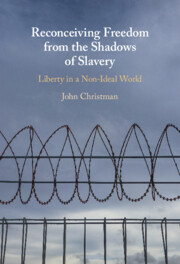Book contents
- Reconceiving Freedom from the Shadows of Slavery
- Reconceiving Freedom from the Shadows of Slavery
- Copyright page
- Dedication
- Contents
- Acknowledgements
- Introduction
- Part I Methodology and a Shift in Perspective
- Part II Reconstructing the Concept of Freedom
- Part III Conclusions and Applications
- Conclusion: Liberty, Democracy, and the Persistence of Unfreedom
- References
- Index
- References
References
Published online by Cambridge University Press: 02 January 2025
- Reconceiving Freedom from the Shadows of Slavery
- Reconceiving Freedom from the Shadows of Slavery
- Copyright page
- Dedication
- Contents
- Acknowledgements
- Introduction
- Part I Methodology and a Shift in Perspective
- Part II Reconstructing the Concept of Freedom
- Part III Conclusions and Applications
- Conclusion: Liberty, Democracy, and the Persistence of Unfreedom
- References
- Index
- References
- Type
- Chapter
- Information
- Reconceiving Freedom from the Shadows of SlaveryLiberty in a Nonideal World, pp. 240 - 252Publisher: Cambridge University PressPrint publication year: 2025

